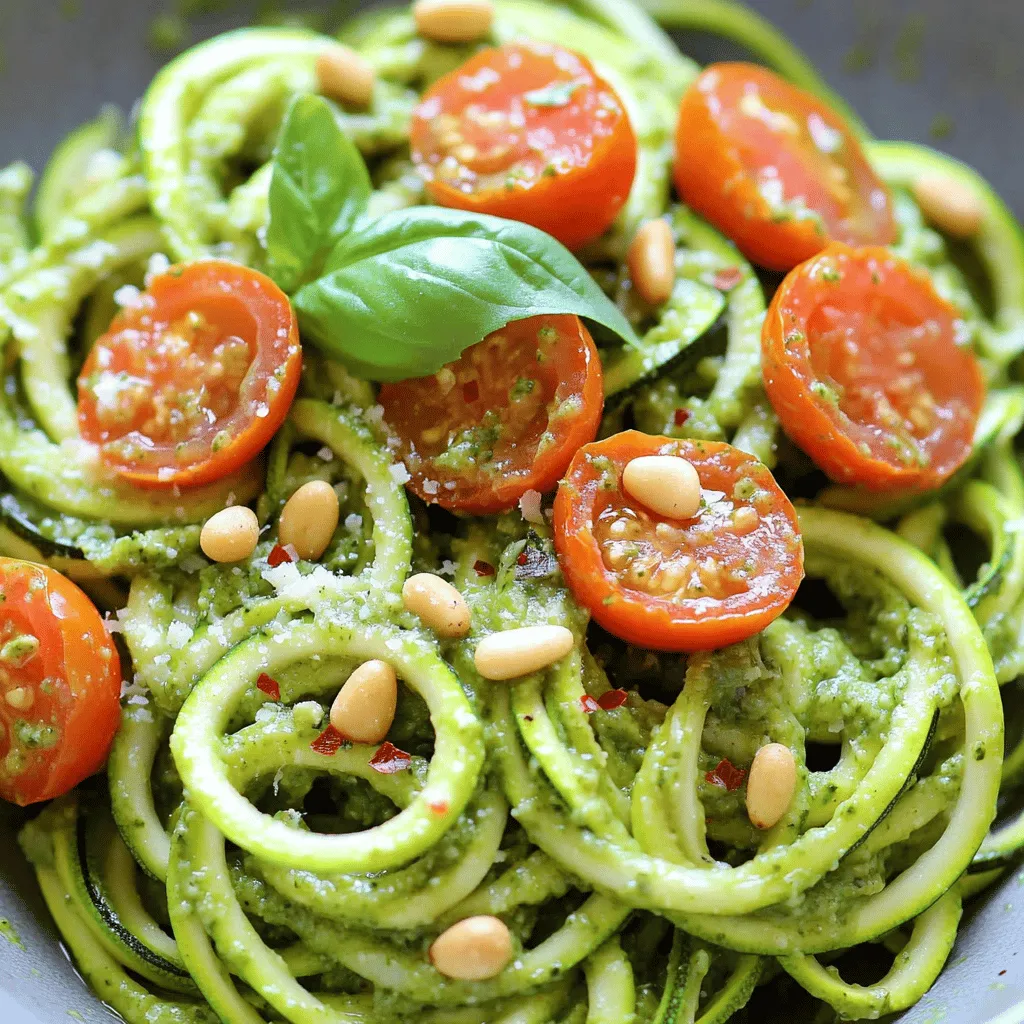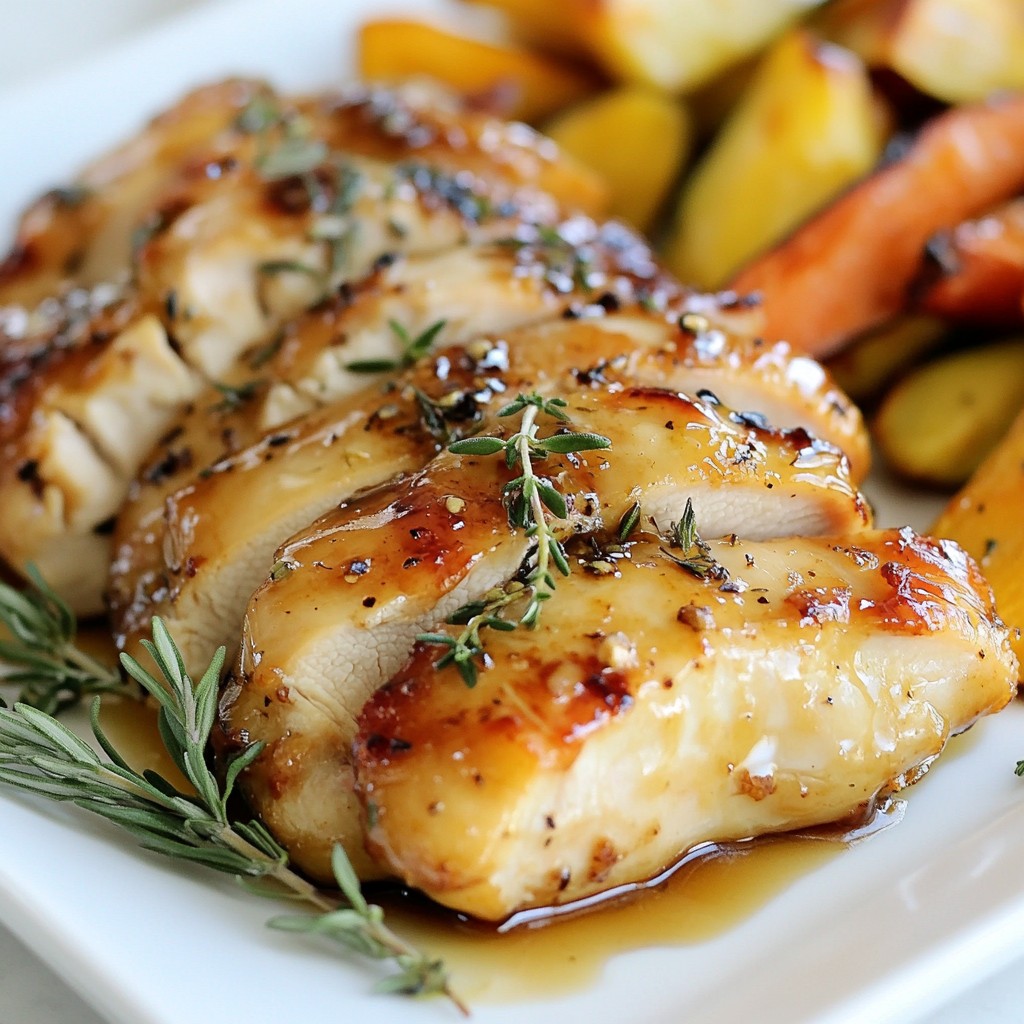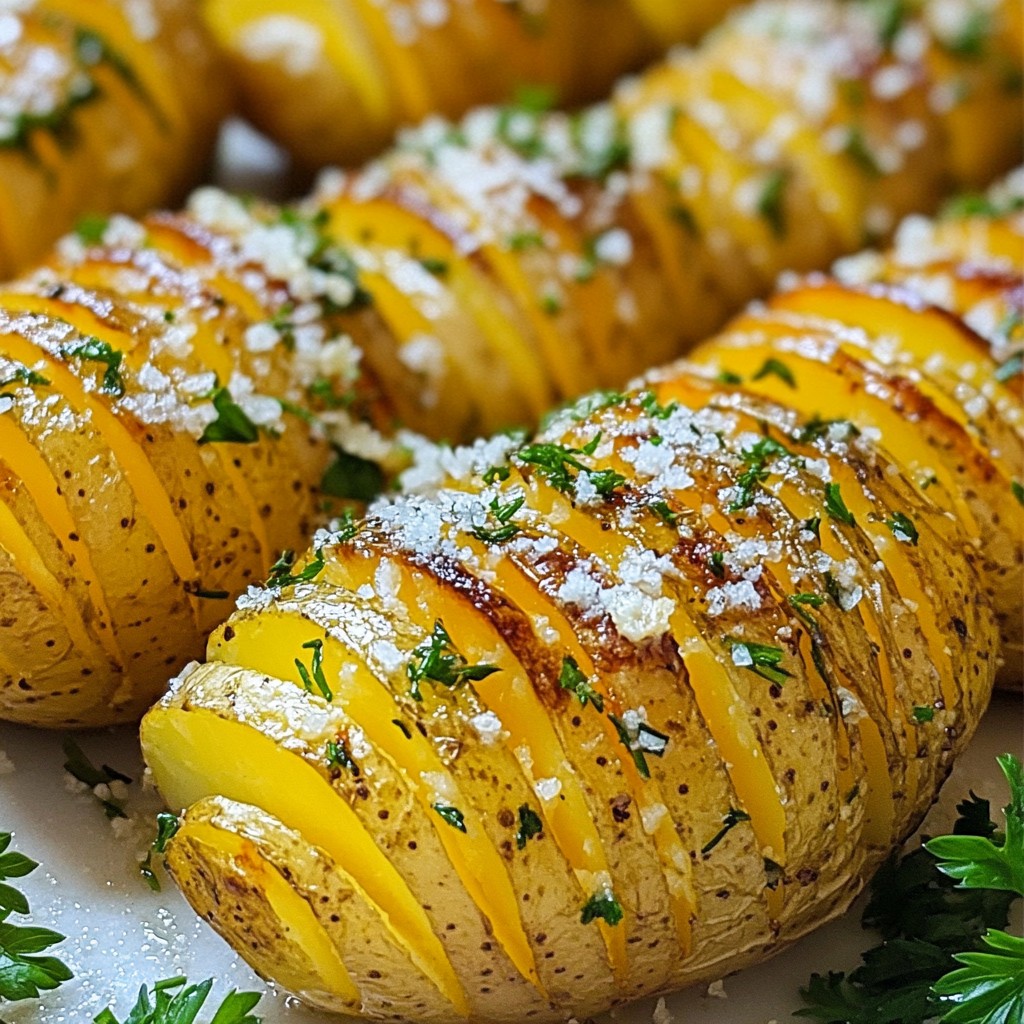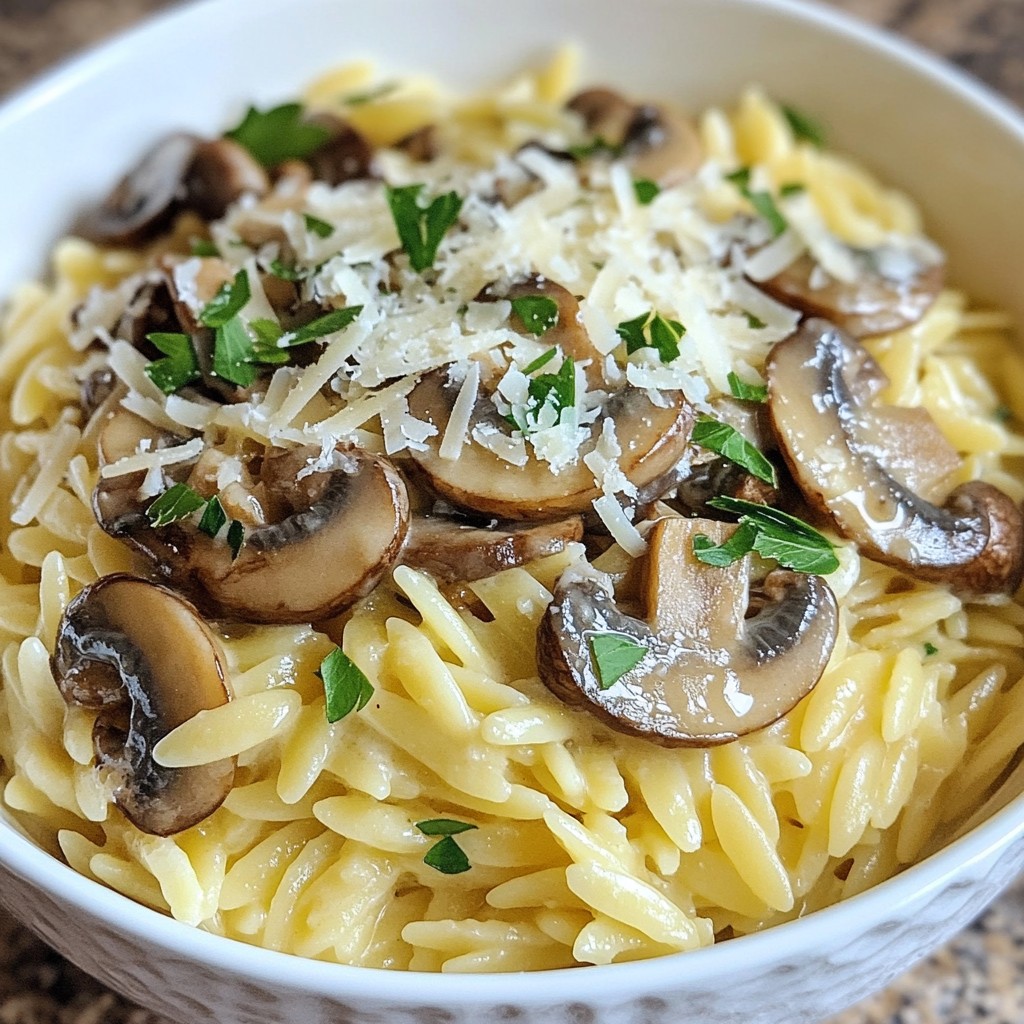Are you ready to transform your meals with a fresh twist? Zucchini noodles with pesto are not only flavorful but also simple to make. This dish is perfect for anyone looking to eat healthier without sacrificing taste. In this guide, I’ll share easy steps, tips, and variations to make your zucchini noodles shine. Let’s dive into this delicious recipe that fits various diets and impresses your taste buds!
Ingredients
Fresh Ingredients Needed
– Zucchini: Use 4 medium zucchinis. Look for firm, shiny skin. Avoid soft or blemished zucchinis. They should be fresh for the best taste.
– Basil: Use 1 cup of fresh basil leaves. Fresh basil adds a bright flavor. Dried basil lacks the same punch.
– Pine Nuts: You need ½ cup of pine nuts. Toast them for a few minutes to unlock their rich flavor. This step enhances the pesto’s taste.
Pantry Staples
– Olive Oil: Use extra virgin olive oil for the best flavor. It has a fruity taste that complements the dish.
– Garlic: Use 1 clove of garlic, minced. Fresh garlic creates a bold taste. Avoid garlic powder for this recipe.
– Parmesan Cheese: Use ¼ cup of grated Parmesan cheese. If you want a vegan alternative, use nutritional yeast instead. This works well for dietary needs.
Optional Ingredients
– Cherry Tomatoes: Adding 1 cup of halved cherry tomatoes brightens the dish. They add a sweet and juicy burst of flavor.
– Red Pepper Flakes: Use ½ teaspoon for a spicy kick. This is optional, but it adds nice heat.
– Nutritional Yeast: This is a great dairy-free cheese alternative. Sprinkle it on for added flavor without the dairy.
Step-by-Step Instructions
Preparing Zucchini Noodles
To start, you need to make zucchini noodles. You can use a spiralizer, a peeler, or a mandoline. Each tool gives you a different noodle shape. I love the spiralizer for its fun curls.
Next, salting the zucchini is key. After slicing, place the noodles in a colander and sprinkle them lightly with salt. This helps pull out extra moisture. Let them sit for about 10 minutes. The result is a firmer noodle that holds sauce better.
Making the Pesto Sauce
Now, let’s create the pesto sauce. First, gather your ingredients: fresh basil leaves, toasted pine nuts, minced garlic, and grated Parmesan cheese.
In a food processor, add the basil, nuts, garlic, and cheese. Start blending these ingredients. As they mix, slowly drizzle in the olive oil. This method helps achieve a smooth blend. If your pesto is too thick, add more olive oil, one tablespoon at a time. Taste and season with salt and black pepper.
Cooking Zucchini Noodles
Now, we can cook the zucchini noodles. First, rinse them under cold water to remove excess salt. Then, pat them dry with paper towels.
Heat a large skillet over medium heat. Add a drizzle of olive oil. Sauté the zucchini noodles for about 2-3 minutes. You want them to soften but still have a crisp bite. Overcooking will make them soggy.
To enhance flavor, add a little more olive oil while cooking. This makes the dish richer and more delicious.
Tips & Tricks
Perfecting the Noodle Texture
Avoiding Sogginess: Key cooking practices
To keep your zucchini noodles from getting soggy, it’s vital to salt them before cooking. This step pulls out moisture, ensuring they stay firm. After cutting your zucchini into noodles, sprinkle them with salt and let them sit for about 10 minutes. Rinse and pat them dry before cooking. This simple practice makes a big difference in texture.
Keeping them al dente: Timing tips
When sautéing your zucchini noodles, aim for a quick cook time. About 2-3 minutes over medium heat is perfect. You want them to be soft but still have a slight bite. Stir gently to avoid breaking the noodles. This method keeps them vibrant and fresh.
Enhancing Flavor Profile
Customizing Pesto: Substitutions and additions
You can make pesto your own by swapping out ingredients. Try using walnuts instead of pine nuts for a different taste. You can also add spinach or arugula to boost nutrition. If you love spice, consider adding jalapeños or a pinch of cayenne pepper to your pesto blend.
Serving Suggestions: Pairing with proteins or sides
Zucchini noodles with pesto pair well with grilled chicken or shrimp. You can also serve them alongside a fresh salad or crusty bread. These options add more flavor and texture, making your meal more satisfying.
Presentation Tips
Plating Techniques: Making the dish visually appealing
To make your dish look great, use a large white plate. This helps the colors pop. Twirl the zucchini noodles into a nest shape in the center of the plate. This adds height and makes it more inviting.
Garnishing Ideas: Creative toppings and herbs
Top your dish with extra toasted pine nuts and fresh basil leaves. A sprinkle of Parmesan cheese adds a nice touch. For an extra kick, try some red pepper flakes on top. These garnishes not only enhance flavor but also make the dish more eye-catching.
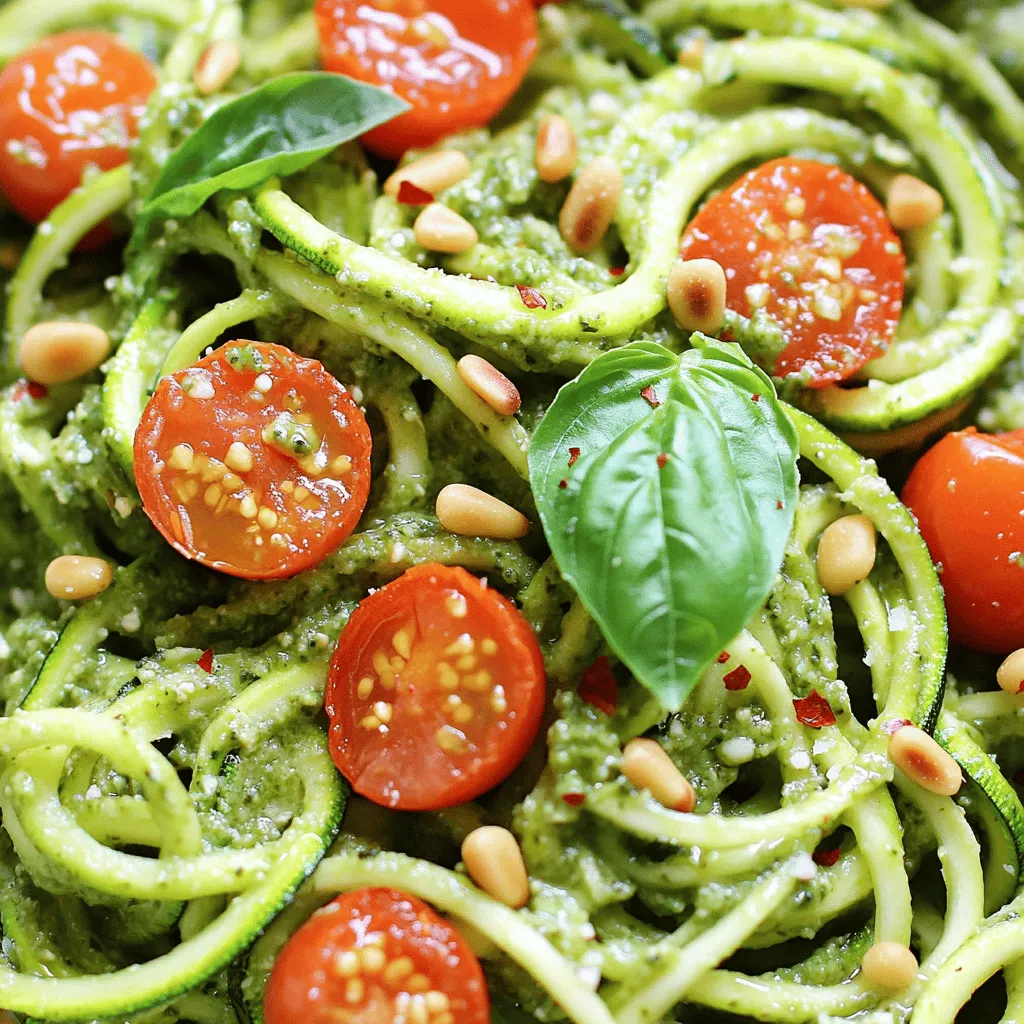
Variations
Seasonal Ingredients
Adding Vegetables: You can switch up the veggies based on the season. In summer, try adding thin slices of bell peppers or fresh corn. In fall, consider using roasted butternut squash or mushrooms for a heartier dish. These additions not only enhance flavor but also give you more color and nutrition.
Incorporating Proteins: Adding protein boosts the meal’s heartiness. You can toss in grilled chicken for a filling option or shrimp for a light touch. If you prefer plant-based options, try adding tofu or chickpeas. These choices make the dish more satisfying and balanced.
Different Pesto Styles
Vegan Pesto: If you’re looking for a vegan twist, swap out the Parmesan. Use nutritional yeast instead. You can also switch pine nuts for sunflower seeds or cashews. This keeps the flavor rich while being dairy-free.
Herb Mixes: Don’t be afraid to mix herbs for a unique taste. Combine basil with parsley or mint for something fresh. Each herb adds its own flair, making your pesto stand out.
Recipe Adaptations
Gluten-Free Options: Zucchini noodles are naturally gluten-free. If you want more variety, you can use spiralized carrots or sweet potatoes. These options maintain the fun of noodles while being gluten-free.
Low-Carb Alternatives: For a low-carb meal, stick with zucchini noodles. You can pair them with a protein like grilled salmon or sautéed spinach. This keeps the meal light and perfect for those watching their carb intake.
Storage Information
Storing Leftovers
To keep your zucchini noodles with pesto fresh, store them in an airtight container. Place them in the fridge. They will stay good for about 3 days. If you want to store them longer, consider freezing. For this, lay the zucchini noodles flat on a baking sheet. Freeze them until solid, then put them in a freezer bag. They can last for up to 2 months in the freezer.
Reheating Guidelines
When it’s time to enjoy your leftovers, you have options. The microwave is quick and easy. Just heat them for about 1-2 minutes. If you want better texture, use the stovetop. Heat a pan over medium-low heat, add a splash of olive oil, and warm the noodles gently. This method helps avoid mushiness. Stir them often and cook for about 3-5 minutes.
Shelf Life
Zucchini noodles can last up to 3 days in the fridge. If they smell bad or feel slimy, it’s time to toss them. If you freeze them, use within 2 months for the best taste. Always check for signs of spoilage before eating. Keep an eye on color changes or off smells, and discard if you notice these signs.
FAQs
How do I make zucchini noodles without a spiralizer?
You can make zucchini noodles without a spiralizer using a few simple tools. A julienne peeler works well. It creates thin, noodle-like strands. A mandoline is another great option. Set it to a thin setting and slice the zucchini lengthwise. Both methods give you tasty noodles without needing extra gadgets.
Can I use regular pasta instead of zucchini noodles?
Yes, you can use regular pasta. However, the texture and flavor will differ. Zucchini noodles are lighter and soak up sauce well. Regular pasta is more filling and chewy. If you want a healthier dish, stick with zucchini noodles. They add freshness and fiber to your meal.
What can I do with leftover pesto?
Leftover pesto is a joy to have! Store it in an airtight container. It can last about a week in the fridge. To use it, mix with cooked pasta, spread on sandwiches, or drizzle over veggies. You can even use it as a pizza sauce for a fresh twist.
Is this recipe suitable for meal prep?
This recipe is perfect for meal prep! You can make the zucchini noodles and pesto ahead of time. Store them separately in airtight containers. When you’re ready to eat, just combine and heat. This keeps the noodles fresh and prevents sogginess.
How can I make this dish spicier?
To add heat to the dish, try red pepper flakes. You can add ½ teaspoon when mixing in the pesto. For a bolder flavor, chop fresh chili peppers and toss them in. You can also use a spicy pesto sauce for an extra kick. Adjust the heat to your taste!
To sum it up, fresh ingredients like zucchini, basil, and pine nuts create the best dishes. Use quality pantry staples like olive oil and garlic for flavor. Follow my steps to make perfect zucchini noodles and pesto. Customize the dish with seasonal veggies or proteins to match your taste. Store leftovers properly to keep them fresh.
Enjoy sharing this simple, healthy meal with friends and family!
